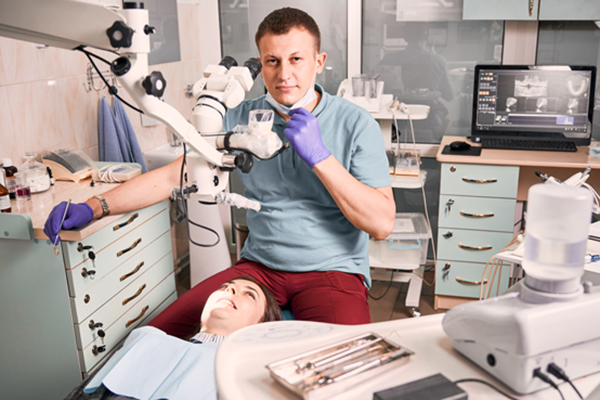When Dentures Are Recommended for Missing Teeth

Getting dentures is the most affordable way to restore lost teeth. These removable dental replacements are easy to acquire as well. Upper and lower dental replacements are custom-fit. Your dentist can recommend them under the right conditions. If you want to know when dentures can replace missing teeth, here are the details.
1. Poor candidate for dental implants
Dental implants are the most durable and stable dental replacements one can get. Even so, this type of restoration only fits the right patients. Jawbone tissue loss can prevent an individual from getting implants. There will be no way to secure the dental implants unless the patient gets a bone graft. The dentist will recommend removable dental restorations instead.
Some patients will need dentures because of chronic conditions. Diabetes and immune system problems will make these patients unsuitable for dental implants. The healing process will be long and difficult if they pursue it. Removable dental restorations do not need the support of the jawbone. These dental replacements can get stability by attaching to adjacent teeth.
2. The option of a more affordable dental replacement
Patients who have a limited budget can get removable dental restorations instead. The process is non-invasive. This means that the dentist does not have to make any permanent alterations to the patient’s teeth. The patient will need to work with the dentist to adjust, repair, or replace these dental restorations if necessary.
3. Quick restoration of one’s smile
The dentist might recommend dentures for those who want to have quick dental replacements. The dentist will take an impression of the patient’s teeth and gums. Then, the lab will receive the impressions and construct the replacements. The patient must wait for two weeks.
The patient will return to the dental clinic to fit the removable dental restorations. Adjustments will follow to ensure a good fit. The dentist will show the patient how to put on, take off, and care for the dentures. The patient will go home with a complete set of teeth.
4. Other reasons for recommending these dental replacements
A dentist can recommend removable dental restorations if the patient’s teeth are beyond restorative procedures. The dentist will need to examine the patient’s teeth completely first. The patient may need to go through some dental extractions. The possible reasons for extracting teeth are:
- Unsuccessful root canal procedure
- Severe tooth decay untreatable with root canal treatment
- Fractured roots
- Severely broken teeth
- Advanced periodontitis
Diabetes, dental implants, and dentures
Dentists do not disqualify a diabetic patient automatically for getting dental implants. These dental replacements are ideal. Titanium rods replace the dental roots. Porcelain crowns replace exposed teeth. Here are some factors dentists consider to determine if the patient should wear dentures or dental implants:
- Uncontrolled diabetes will only result in failed implants. It will also cause serious complications. Healing and implant integration problems will arise. That is why dentists recommend removable dental replacements rather than implants.
- The onset of oral infections and gum disease is easy among individuals with diabetes. Treating these conditions must happen first before dental implant surgery. Removable dental restorations will have to do if the infections do not receive treatment.
- Committing to pre- and post-operative care is important in getting dental implants. Watching blood glucose levels and food choices is crucial in controlling blood sugar levels. Whole foods like chicken and vegetables are good in controlling blood sugar levels. If the patient fails to do this, then dentures will be the patient’s option for dental replacements.
The types of removable dental restorations
A patient will need complete dentures if the dentist needs to remove the patient’s upper and lower teeth. The dentist must also take new impressions if the patient needs to replace the old ones. The dental replacements will fit over the jawbone and gums right after the dental extraction. This will prevent the remaining teeth from shifting. It will also keep the jawbone and gums from changing in shape.
Partial dentures are designed to fill the gaps left by missing teeth. These replacements often have a metal plate, plastic, and nylon with a specific number of synthetic teeth on them. These replacements have a metal clasp to anchor to the adjacent teeth. The patient can remove and clip it on.
Dentists can recommend dentures based on your dental condition and preference
Getting these dental replacements can be a good thing. These dental appliances are sturdy if the lab technician is skilled and experienced. The dentist may need to recommend them for the immediate filling of dental spaced after an extraction. You may choose them for budget reasons. Working with your dentist can help you get and maintain the right type of dentures.
Get more information about The Smile Spa in Agoura Hills at https://agourahillscosmeticdentists.com.
Check out what others are saying about our services on Yelp: Read our Yelp reviews.
Recent Posts
Anyone familiar with oral hygiene basics knows that dentists recommend brushing twice a day: once in the morning and once at night. However, you may not know why this is so. Why is once not enough? After all, experts recommend flossing only once a day. How is brushing your teeth different?Brushing your teeth is a…
Tooth extraction can be an intimidating prospect, but when recommended, it is a necessary step for maintaining good oral health. This routine procedure removes a severely decayed, damaged, or crowded tooth, alleviating pain and discomfort. Understanding the extraction process and how to recover effectively afterward can make the whole experience much smoother.A general dentist will…
Though brushing your teeth is one of the most important oral hygiene basics, flossing is just as vital. Here is how flossing can strengthen your teeth and benefit your overall health.Flossing is an essential part of your oral care routine because it removes plaque from your teeth. Plaque is a soft, sticky substance that bacteria…
Teeth brushing is one of the most important oral hygiene basics, as it removes plaque from teeth. However, the toothbrush you use can impact how effective this practice is.To optimize toothbrushing, you need to find a brush that fits your needs. Fortunately, there are many options out there.When you first learned oral hygiene basics, you…


